New push for sustainable development reporting in banking industry
Sharing at the seminar "Practicing Sustainable Development Reporting in the Banking Sector with AI Solutions" organized by Banking Times in collaboration with the Association of Chartered Certified Accountants (ACCA) on May 21, Mr. Mike Suffield, Director of Policy and In-depth Research of ACCA Global, said that AI is not only a tool to improve performance but also a strategic factor to help improve the quality and reliability of reports in the financial industry.
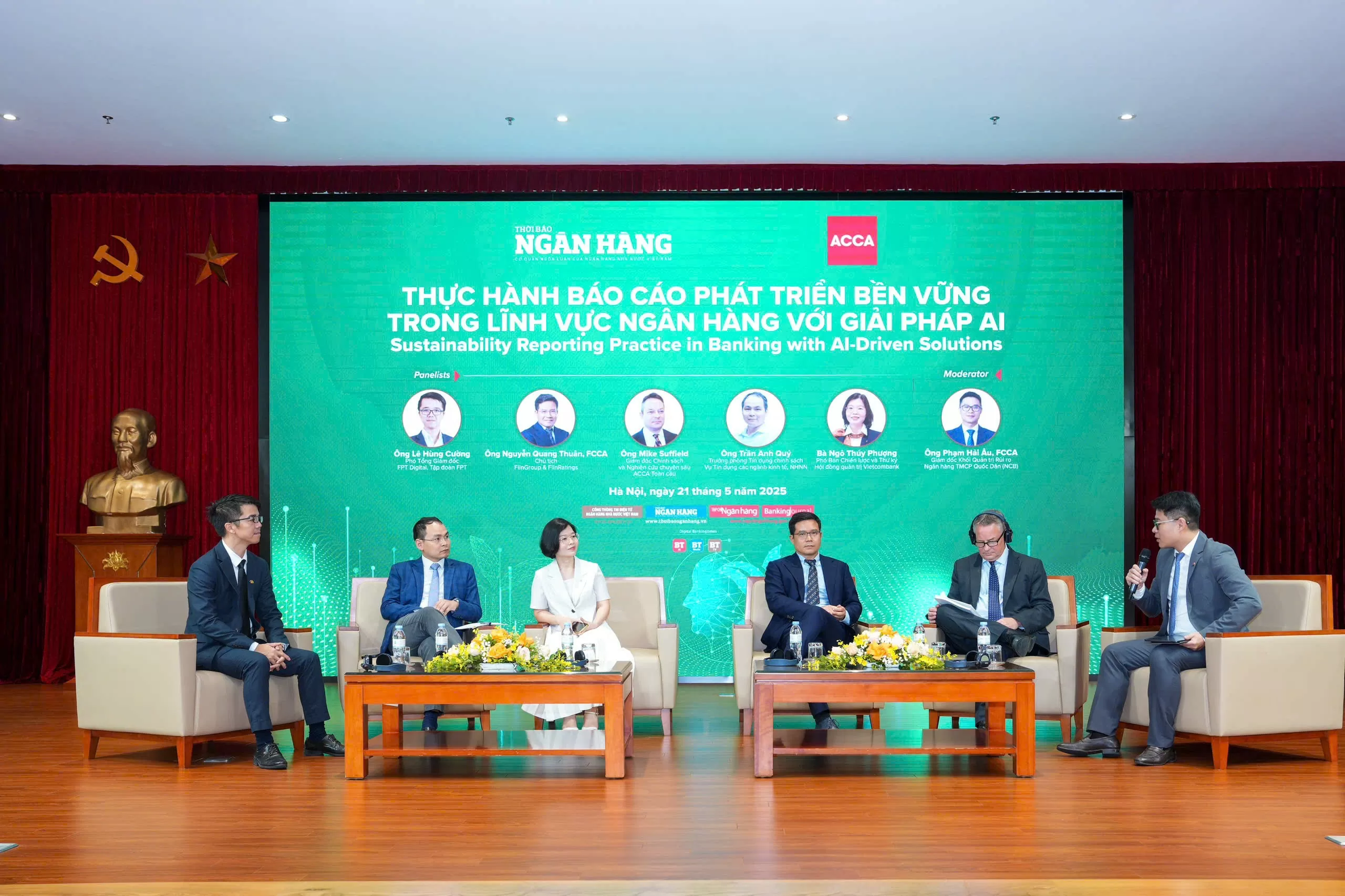 |
| Seminar “Practicing Sustainable Development Reporting in Banking with AI Solutions”. Photo: Hoang Giap |
According to him, AI is widely applied in the financial industry from machine learning, computer vision, natural language processing to new generations such as generative AI and agentic AI. Applications range from revenue forecast analysis, fraud detection to reporting, process coordination or customer support... However, Mr. Mike also noted that these technologies are still in the process of completion and cannot completely replace traditional processes.
“ACCA has developed an eight-stage model for the sustainability reporting cycle, from assigning responsibilities, establishing context, identifying key information, to verification and continuous improvement. Each step can harness the power of AI. In the context setting step, AI helps to quickly understand and synthesize reporting requirements. When assessing climate risks, AI can simulate scenarios, analyze satellite data such as Google Flood Hub or Climate TRACE. The report presentation stage can also be personalized by AI, suitable for different groups of audiences,” Mr. Mike Suffield informed.
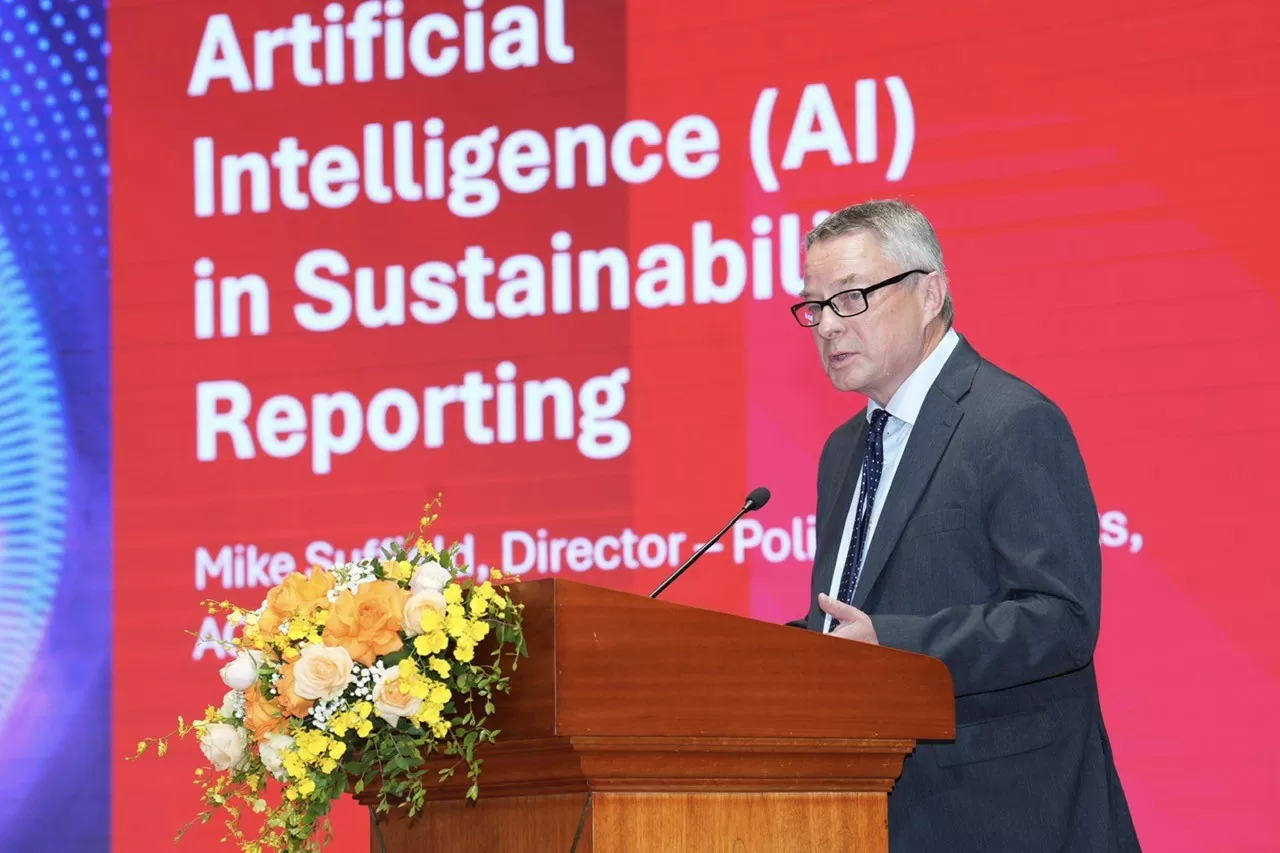 |
| Mr. Mike Suffield, Director of Policy and Research of ACCA Global, speaking. Photo: Hoang Giap |
However, the expert also warned that many organizations do not have the right data systems or infrastructure to effectively leverage AI. Disjointed data, lack of standards, or lack of internal links between finance, technology, and data departments are major barriers. He recommended a step-by-step approach, from improving internal governance to strengthening organizational connectivity.
One notable point that Mr. Mike Suffield shared was the ethical and responsible aspect in using AI. He emphasized that any AI application needs to be evaluated based on the five ethical principles established by ACCA: integrity, objectivity, professional competence and care, confidentiality and professional conduct.
“If AI is trained on biased, outdated, or underrepresented data, the reports it generates can be misleading, posing a serious threat to an organization’s integrity and core values. When AI automatically generates reporting content that lacks the connection between financial and non-financial information, transparency is eroded,” he said.
One of the common risks is blindly relying on AI output without taking steps to verify and validate it. That’s why Mike believes that traditional professional skills such as internal auditing, data analysis, and fact-checking remain indispensable. He also mentioned the “environmental footprint,” a less-discussed impact of AI today.
According to the Electric Power Research Institute, each query to ChatGPT consumes 10 times more electricity than Google. ChatGPT alone has 200 million weekly users, not to mention platforms like Claude, Gemini, LLaMA… This explosion has pushed up the demand for electricity. According to Goldman Sachs, electricity consumption of global data centers could increase by 160% by 2030, accounting for 4% of total global electricity demand and risking doubling greenhouse gas emissions compared to 2022.
Data centers also consume a huge amount of water for cooling. In 2022, Google and Microsoft used the equivalent of 700,000 Americans to cool their servers. With fresh water becoming increasingly scarce, this trend poses a paradox of “sustainability in sustainable technology.”
Mike urges CFOs to consider the environmental costs in addition to the investment costs and the return on investment when investing in AI. The choice of technology platform should be linked to the organization's emissions strategy. At the same time, he emphasizes the role ofeducation and changing organizational culture. AI is only effective when "fed" with quality data, while currently up to 80% of data in businesses is "dark data", which is no longer useful but still consumes storage resources. Therefore, raising internal awareness, auditing data and behaving responsibly with information are indispensable foundations for the success of sustainability reporting.
 |
| Mr. Tran Anh Quy, Head of Policy Credit Department, Department of Credit for Economic Sectors, State Bank of Vietnam, speaking. Photo: Hoang Giap |
Building the ESG-AI ecosystem “Make in Vietnam”
From a domestic policy perspective, Mr. Tran Anh Quy, Head of Policy Credit Department, Department of Credit for Economic Sectors, State Bank, said that sustainable development reports (SDGs) are becoming an inevitable trend and a long-term orientation of the banking industry. In 2024, the number of published SDGs reports increased to a record, reaching 33 organizations, of which 6 banks published for the first time. The system of related regulations is also increasingly improved, from Decree 155/2020/ND-CP of the Government detailing the implementation of a number of articles of the Securities Law, Circular 96/2020/TT-BTC guiding information disclosure on the stock market and Circular No. 116/2020/TT-BTC guiding a number of articles on corporate governance applicable to public companies..., to industry strategies such as Decision 986/QD-TTg of the Prime Minister on approving the Strategy for development of the Vietnamese banking industry to 2025, with a vision to 2030 or decisions of the State Bank on green banking, green growth...
According to statistics, as of March 31, 2025, 58 credit institutions had green loans with a total value of more than VND 704,200 billion, an increase of 3.57% compared to the end of 2024. Green loans mainly focus on renewable energy (37%) and green agriculture (29%). Outstanding loans assessed for environmental and social risks also reached over VND 3.62 million billion at 57 credit institutions.
However, credit institutions still face many difficulties, especially high reporting costs, lack of specialized human resources and a clear legal framework. Proposed solutions include early issuance of the National Green Classification Catalogue, strengthening international cooperation, improving the quality of consultancy and promoting training. Institutions also need to proactively allocate resources for ESG practices and build appropriate governance frameworks.
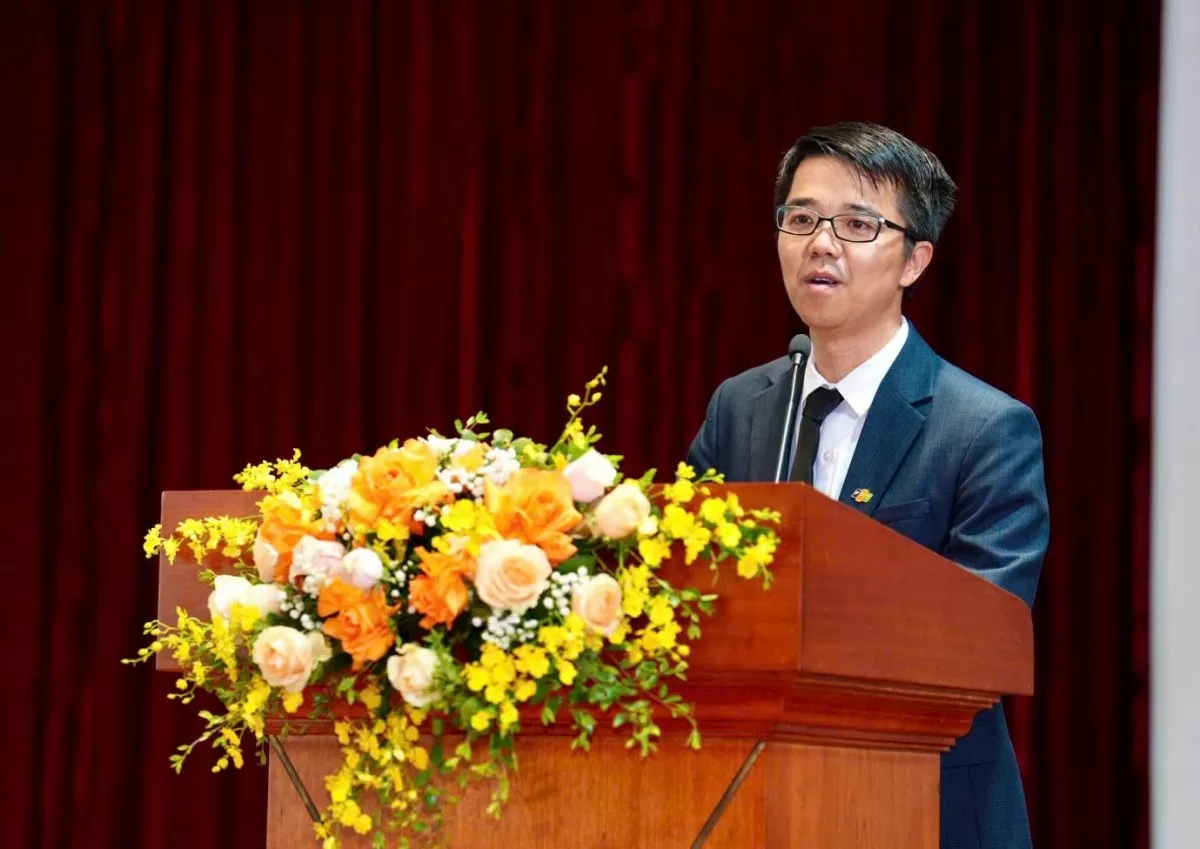 |
| Dr. Le Hung Cuong, Deputy General Director of FPT Digital, FPT Corporation, speaking. Photo: Hoang Giap |
Representative from the business sector, Dr. Le Hung Cuong, Deputy General Director of FPT Digital, FPT Corporation, pointed out the fact that 70% of businesses have not published ESG reports or have published incomplete reports, mainly due to lack of knowledge and difficulties in collecting and analyzing data. The solution that FPT offers is to apply digital technology and AI to simplify the process, integrate data from ERP systems, IoT, supply chains, etc., standardize according to international frameworks (GRI, ISSB) and automate the reporting process.
Mr. Cuong also shared international experiences such as the Monetary Authority of Singapore (MAS) developing the Gprnt platform to simplify ESG reporting for small and medium-sized enterprises (SMEs), or the Gaia project of the European Central Bank, Germany and Spain, and the Bank for International Settlements (BIS) using AI to analyze more than 2,300 ESG reports to monitor climate risks. The accuracy reached 98% in identifying documents that did not contain climate risk information and 80% in classifying climate risks from relevant documents...
| In Vietnam, FPT has deployed VertZero software for a bank to inventory greenhouse gas emissions and build a “Make in Vietnam” ESG-AI ecosystem to serve businesses in transformation and access to green capital. |
Source: https://congthuong.vn/ai-vao-cuoc-ngan-hang-buoc-sang-chuan-esg-toan-cau-388632.html







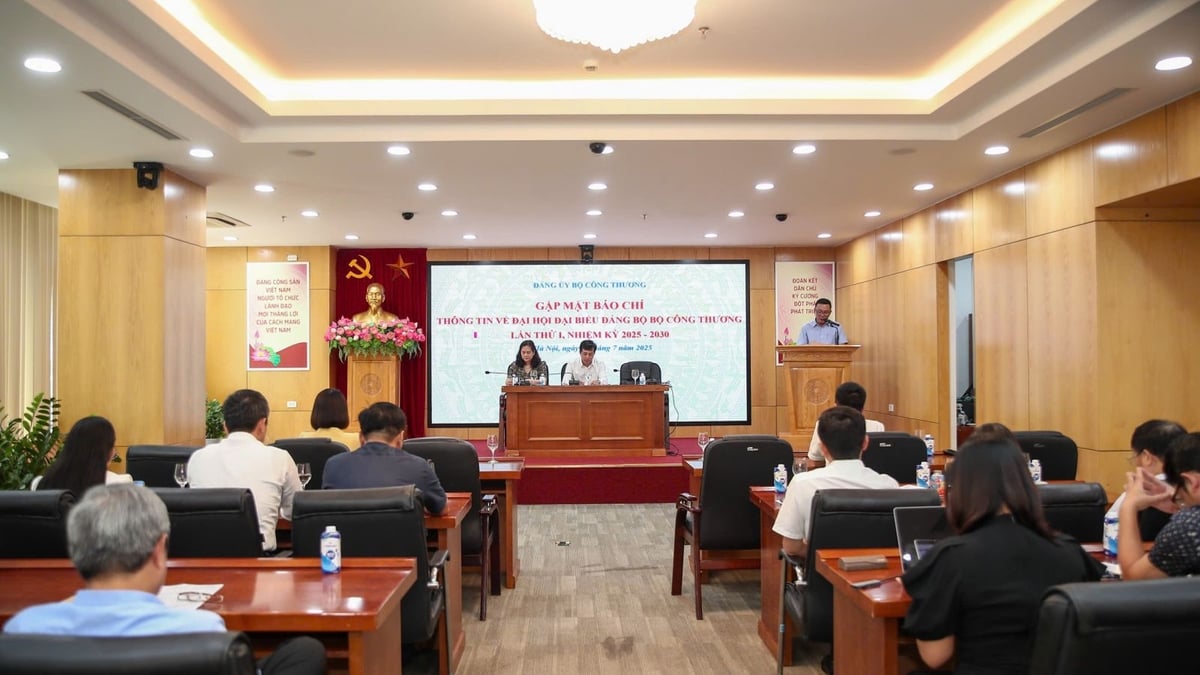













































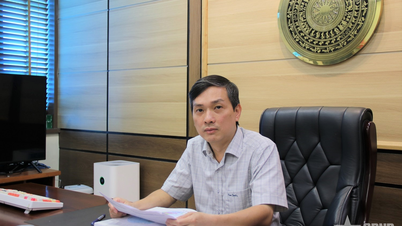














































Comment (0)